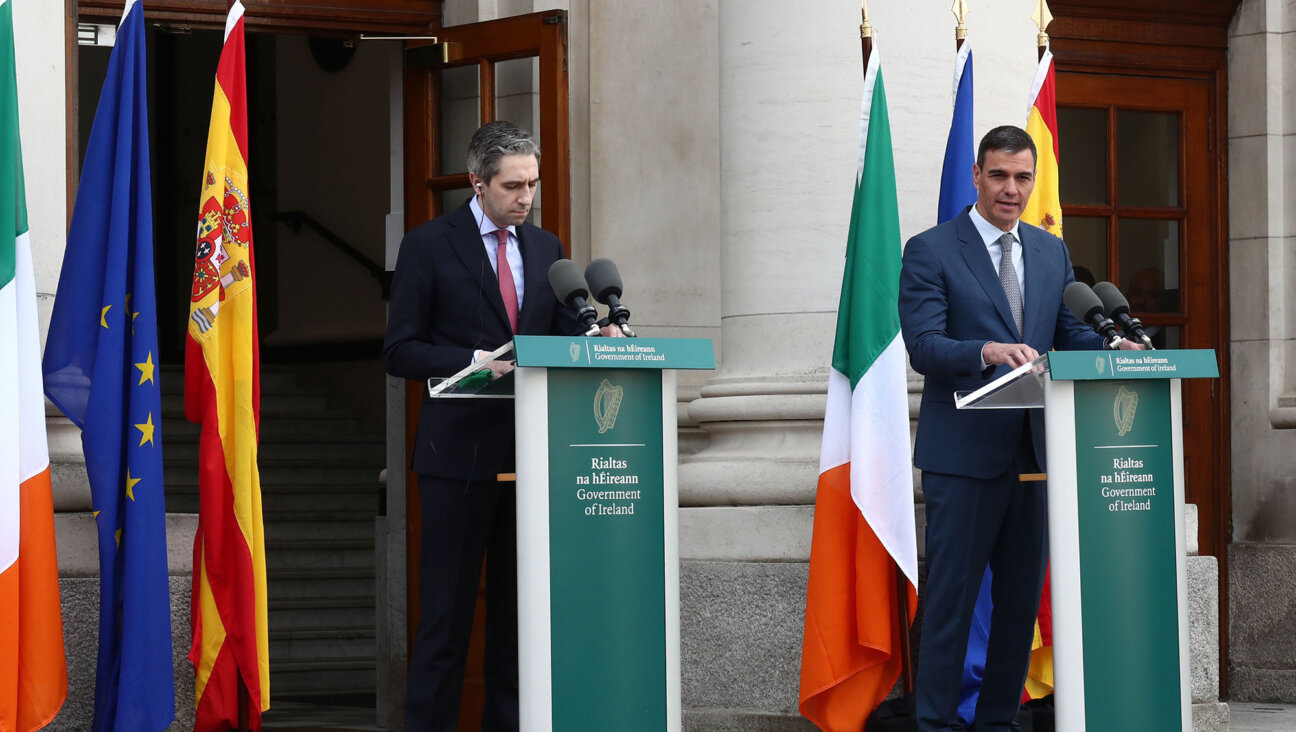Israel Made A Huge Mistake. Trump Is Terrible For The Jews

President Donald Trump shakes hands with Prime Minister Benjamin Netanyahu as they meet in the Oval Office of the White House on March 5, 2018 in Washington, D.C. (Photo by Olivier Douliery-Pool/Getty Images) Image by Getty Images
A recent poll found that three out of four Israelis approve of U.S. President Donald Trump’s handling of U.S.-Israel relations, while nearly 60% of American Jews disapprove of it.
In the wake of these results, an Israeli colleague asked me: Is it possible that Israelis are right? That Trump is actually good for Israel?
It’s a fair question, but, upon reflection, I concluded that it was formulated incorrectly. The question should be: Is it possible that the willful destruction of the post-World War II, rules-based liberal international order is good for Israel? Because, whether they are conscious of the fact or not, in standing with Trump, this is what Israelis are supporting.
Almost from the moment of its creation, Israel has chafed under the restrictions placed on it by the rules-based order, most notably with respect to its military conduct in the region and beyond, and to its treatment of land occupied in the 1967 War and that land’s residents. With the breakdown of the peace process over the past decade, and the disappearance of any pretense that Israel wants peace with the Palestinians or intends to ever end the occupation, this chafing has reached a critical point.
International law cannot accommodate Israel’s continuing project to change the facts on the ground in the West Bank and East Jerusalem or the ongoing mass human rights violations the occupation entails; Israel’s annexation of territory acquired by military force in 1967 is fundamentally incompatible with the rules-based international order.
This context is key to understanding why the majority of Israelis, and a smaller number of right-wing American Jews, apparently have come to believe that Israel would be better off in a world order that tears up the existing rules. For some, this preference seems rooted in an ideology that prioritizes settlements and the expansion of Israel’s borders over all else. Others embrace the simplistic argument that international institutions and law are inherently anti-Israel and therefore not worth preserving.
Still others, bolstered by the self-exonerative narrative holding that Israeli efforts to achieve peace have been rewarded with terrorism, are almost certainly driven by the conviction that liberalism — and especially concern for liberal values like human rights and civil liberties — is for freiers — Yiddish for “suckers.”
In contrast, most American progressives, including the vast majority of American Jews, are deeply alarmed by Trump’s assault on the current order, both foreign and domestic. The liberal world order that exists today came out of the Holocaust, and the values around which it is organized still define the identity of most American Jews. That liberal world order was designed — with significant participation of Jewish jurists — to ensure the world would never again permit genocide. It was built to enshrine a set of norms and rules according to which all members of the community of nations must refrain from the most inhumane of policies, must set aside the most heinous of weapons and must respect the fundamental and inalienable rights of every human being, especially the most vulnerable.
Clearly, this order is imperfect, as demonstrated by the myriad atrocities and injustices that have in part characterized this era. Yet, by every measure, it has given rise to a sustained period of greater peace, stability and standards of living for people across the globe than any time in the past.
This order, likewise, created the modern state of Israel — and it is within this order that Israel has prospered for seven decades. Israel has benefitted, no doubt, from the energy and ingenuity of its citizens, as well as from the extraordinary economic, military and diplomatic support of the United States. But more broadly, Israel has reaped the fruits of being born into a stable world and an international environment supportive of political and economic cooperation in every sphere.
It is an understatement of the highest magnitude to observe that, throughout history, Jews have fared poorly under illiberalism. Jews have learned through generations of painful experience that in a might-makes-right world order, the vulnerable suffer.
Perhaps Israelis have such confidence in their country’s powerful army, nuclear arsenal, flourishing economy and alliance with the Trump Administration that they are certain they will be beneficiaries, not victims, of a new illiberal world order. But Israelis’ embrace of illiberalism, both in their own domestic politics (which have been sliding rapidly down the illiberal slope for more than a decade) and in the world, hints at something deeper. It suggests that the majority of Israelis have come to believe that so long as their own personal and tribal interests are assured, the welfare of the rest of humanity — whether this means vulnerable populations inside Israel, Palestinians living under occupation or anyone else — is not their concern.
Many have sought of late to illuminate the challenges plaguing liberal Zionism and to diagnose the causes for the growing gap between American Jews and Israel. Israelis’ continued strong support for Trump, alongside the readiness of Israeli leaders and their American fellow travelers to make common cause with “pro-Israel” neo-Nazis, fascists and anti-Semites, shines a harsh spotlight on the core of the problem.
Is President Trump good for Israel? The answer will depend on whom you ask, and on whether that person believes the lesson of the Holocaust is “never again,” or “never to us.”
Lara Friedman is the President of the Foundation for Middle East Peace.





















